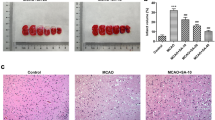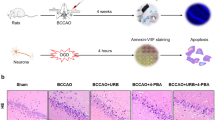Abstract
Remote ischemic postconditioning (RIPostC) has been proved to protect the brain from stroke, but the precise mechanism remains not fully understood. In the present study, we aimed to investigate whether RIPostC attenuates cerebral ischemia-reperfusion injury by abating endoplasmic reticulum (ER) stress response. CHOP, a multifunctional transcription factor in ER stress, regulates the expression of genes related to apoptosis, such as Bim and Bcl-2. Male SD rats were subjected to right middle cerebral artery occlusion (MCAO) for 2 h followed by reperfusion, and RIPostC was induced by three cycles of 10 min ischemia and 10 min reperfusion on bilateral femoral arteries immediately after ischemia. CHOP siRNA (CHOPi) and control siRNA (Coni) were injected into the right lateral ventricle 30 min before the beginning of ischemia. RIPostC, CHOPi, or RIPostC + CHOPi application reduced infarct volume, improved the neurological function, and decreased cell apoptosis. RIPostC increased the protein level of glucose-regulated protein 78 (GRP78) and decreased the protein level of phosphorylated-EIF2α, caspase-12, and CHOP. Furthermore, the expression of CHOP, Bim and cleaved-caspase-3 was decreased, while Bcl-2 expression was increased in response to application of RIPostC, CHOPi, or RIPostC + CHOPi. In sum, RIPostC protects against ischemia-reperfusion brain injury in rats by attenuating ER stress response-induced apoptosis.





Similar content being viewed by others
References
Hess DC, Hoda MN, Bhatia K. Remote limb preconditioning and postconditioning: will it translate into a promising treatment for acute stroke? Stroke. 2013;44(4):1191–7.
Zhao H, Sapolsky RM, Steinberg GK. Interrupting reperfusion as a stroke therapy: ischemic postconditioning reduces infarct size after focal ischemia in rats. J Cereb Blood Flow Metab. 2006;26(9):1114–21.
Xing B, Chen H, Zhang M, Zhao D, Jiang R, Liu X, et al. Ischemic postconditioning inhibits apoptosis after focal cerebral ischemia/reperfusion injury in the rat. Stroke. 2008;39(8):2362–9.
Wang JY, Shen J, Gao Q, Ye ZG, Yang SY, Liang HW, et al. Ischemic postconditioning protects against global cerebral ischemia/reperfusion-induced injury in rats. Stroke. 2008;39(3):983–90.
Pignataro G, Meller R, Inoue K, Ordonez AN, Ashley MD, Xiong Z, et al. In vivo and in vitro characterization of a novel neuroprotective strategy for stroke: ischemic postconditioning. J Cereb Blood Flow Metab. 2008;28(2):232–41.
Robin E, Simerabet M, Hassoun SM, Adamczyk S, Tavernier B, Vallet B, et al. Postconditioning in focal cerebral ischemia: role of the mitochondrial ATP-dependent potassium channel. Brain Res. 2011;1375:137–46.
Yuan Y, Guo Q, Ye Z, Pingping X, Wang N, Song Z. Ischemic postconditioning protects brain from ischemia/reperfusion injury by attenuating endoplasmic reticulum stress-induced apoptosis through PI3K-Akt pathway. Brain Res. 2011;1367:85–93.
Vinten-Johansen J, Shi W. The science and clinical translation of remote postconditioning. J Cardiovasc Med (Hagerstown). 2013;14(3):206–13.
Marciniak SJ, Ron D. Endoplasmic reticulum stress signaling in disease. Physiol Rev. 2006;86(4):1133–49.
Ron D, Walter P. Signal integration in the endoplasmic reticulum unfolded protein response. Nat Rev Mol Cell Biol. 2007;8(7):519–29.
Malhotra JD, Kaufman RJ. The endoplasmicreticulum and the unfolded protein response. Semin Cell Dev Biol. 2007;18(6):716–31.
Kim I, Xu W, Reed JC. Cell death and endoplasmicreticulum stress: disease relevanceand therapeutic opportunities. Nat Rev Drug Discov. 2008;7(12):1013–30.
Roussel BD, Kruppa AJ, Miranda E, Crowther DC, Lomas DA, Marciniak SJ. Endoplasmic reticulum dysfunction in neurological disease. Lancet Neurol. 2013;12(1):105–18.
De Keyser J, Sulter G, Luiten PG. Clinical trials with neuroprotective drugs in acute ischaemic stroke: are we doing the right thing? Trends Neurosci. 1999;22(12):535–40.
Hetz C, Chevet E, Harding HP. Targeting the unfolded protein response in disease. Nat Rev Drug Discov. 2013;12(9):703–19.
McCullough KD, Martindale JL, Klotz LO, Aw TY, Holbrook NJ. Gadd153 sensitizes cells to endoplasmic reticulum stress by down-regulating Bcl2 and perturbing the cellular redox state. Mol Cell Biol. 2001;21(4):1249–59.
Puthalakath H, O’Reilly LA, Gunn P, Lee L, Kelly PN, Huntington ND, et al. ER stress triggers apoptosis by activating BH3-only protein Bim. Cell. 2007;129(7):1337–49.
Yoneda T, Imaizumi K, Oono K, Yui D, Gomi F, Katayama T, et al. Activation of caspase-12, anendoplastic reticulum (ER) resident caspase, through tumor necrosis factor receptor-associated factor 2-dependent mechanism in response to the ER stress. J Biol Chem. 2001;276(17):13935–40.
Harding HP, Zhang Y, Ron D. Protein translation and folding are coupled by an endoplasmic-reticulum-resident kinase. Nature. 1999;397(6716):271–4.
Marciniak SJ, Garcia-Bonilla L, Hu J, Harding HP, Ron D. Activation-dependent substrate recruitment by the eukaryotic translation initiation factor 2 kinase PERK. J Cell Biol. 2006;172(2):201–9.
Qi ZF, Luo YM, Liu XR, Wang RL, Zhao HP, Yan F, et al. AKT/GSK3β-dependent autophagy contributes to the neuroprotection of limb remote ischemic postconditioning in the transient cerebral ischemic rat model. CNS Neurosci Ther. 2012;18:965–73.
Bederson JB, Pitts LH, Tsuji M, Nishimura MC, Davis RL, Bartkowski H. Rat middle cerebral artery occlusion: evaluation of the model and development of a neurologic examination. Stroke. 1986;17(3):472–6.
De Ryck M, Van Reempts J, Borgers M, Wauquier A, Janssen PA. Photochemical stroke model: flunarizine prevents sensorimotor deficits after neocortical infarcts in rats. Stroke. 1989;20(10):1383–90.
Swanson RA, Morton MT, Tsao-Wu G, Savalos RA, Davidson C, Sharp FR. A semiautomated method for measuring brain infarct volume. J Cereb Blood Flow Metab. 1990;10(2):290–3.
Liu XR, Luo M, Yan F, Zhang CC, Li SJ, Zhao HP, et al. Ischemic postconditioning diminishes matrix metalloproteinase 9 expression and attenuates loss of the extracellular matrix proteins in rats following middle cerebral artery occlusion and reperfusion. CNS Neurosci Ther. 2012;18(10):855–63.
Hayashi T, Saito A, Okuno S, Ferrand-Drake M, Chan PH. Induction of GRP78 by ischemic preconditioning reduces endoplasmic reticulum stress and preventsdelayed neuronal cell death. J Cereb Blood Flow Metab. 2003;23(8):949–61.
Shibata M, Hattori H, Sasaki T, Gotoh J, Hamada J, Fukuuchi Y. Activation of caspase-12 by endoplasmic reticulum stress induced by transient middle cerebral artery occlusion in mice. Neuroscience. 2003;118(2):491–9.
Nakka VP, Gusain A, Raghubir R. Endoplasmic reticulum stress plays critical role in brain damage after cerebral ischemia/reperfusion in rats. Neurotox Res. 2010;17(2):189–202.
Tajiri S, Oyadomari S, Yano S, Morioka M, Gotoh T, Hamada JI, et al. Ischemia-induced neuronal cell death is mediated by the endoplasmic reticulum stress pathway involving CHOP. Cell Death Differ. 2004;11(4):403–15.
He Z, Ostrowski RP, Sun X, Ma Q, Huang B, Zhan Y, et al. CHOP silencing reduces acute brain injury in the rat model of subarachnoid hemorrhage. Stroke. 2012;43(2):484–90.
Rutkowski DT, Arnold SM, Miller CN, Wu J, Li J, Gunnison KM, et al. Adaptation to ER stress is mediated by differential stabilities of pro-survival and pro-apoptotic mRNAs and proteins. PLoS Biol. 2006;4(11):e374.
Kim SH, Hwang CI, Juhnn YS, Lee JH, Park WY, Song YS. GADD153 mediates celecoxib-induced apoptosis in cervical cancer cells. Carcinogenesis. 2007;28(1):223–31.
Acknowledgments
This work was supported by the Natural Science Foundation of China (Grant nos. 81000504, 81171241, 81271462) and Beijing Natural Science Foundation (Grant nos. 7111003, 7132112).
Conflict of Interest
Xiangrong Liu, Shangfeng Zhao, Fang Liu, Jun Kang, Ao Xiao, Fang Li, Chencheng Zhang, Feng Yan, Haiping Zhao, Mei Luo, Yumin Luo, and Xunming Ji declare that they have no conflict of interest. All institutional and national guidelines for the care and use of laboratory animals were followed.
Author information
Authors and Affiliations
Corresponding authors
Rights and permissions
About this article
Cite this article
Liu, X., Zhao, S., Liu, F. et al. Remote Ischemic Postconditioning Alleviates Cerebral Ischemic Injury by Attenuating Endoplasmic Reticulum Stress-Mediated Apoptosis. Transl. Stroke Res. 5, 692–700 (2014). https://doi.org/10.1007/s12975-014-0359-5
Received:
Revised:
Accepted:
Published:
Issue Date:
DOI: https://doi.org/10.1007/s12975-014-0359-5




